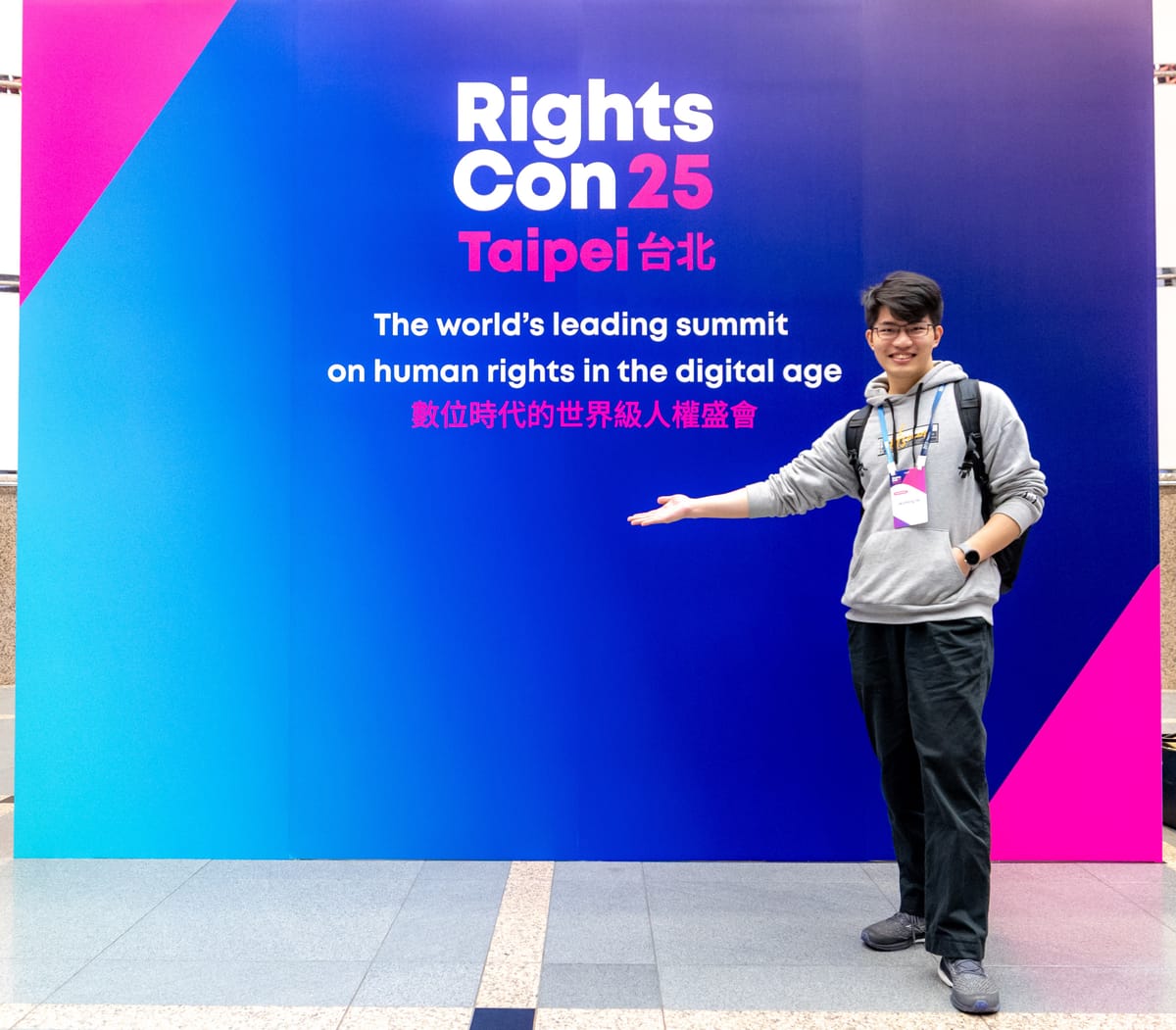資工人誤闖國際數位人權會議現場,是什麼體驗?
——RightsCon 2025 Taipei 參與心得

這次有幸得到 OCF 的免費社群票,到 TICC 參與 RightsCon 全球數位人權大會 2025 Taipei。雖然那一週已經開學加上決定當個好學生不翹課,最後只有週三一個下午到現場逛逛。
現場會眾都是外國人,有看到的臺灣人和 g0v summit 的參與者重疊程度相當高,都是長期關心並且以實際行動參與公民行動的工作者及志工。會場攤位也都是以國際對於隱私及數位人權非常在乎的非營利組織或是企業,在逛攤位時認識了很多新的單位,就算是安靜的看文宣也開闊了很多視野,也認識了一些之後或許可以用用看的服務。
值得一提的是:當時美國政府效率部(Department of Government Efficiency, DOGE)正處於大刀闊斧砍掉各種議題推動經費的狀態,而因為有非常多的相關主題都和網路、隱私和人權相關,因此無論是在議程中的 Roundtable 分享還是大家的聊天內容時時離不開 DOGE 帶來的衝擊和各個單位受到的影響。
對於我來說,因為多少有參與 g0v 黑客松及開放原始碼社群,因此對於臺灣的數位文化及人權隱私的生態有些了解。但在 RightsCon 裡,無論是議題還是規模都提升了一個檔次,光是知道原來有這些各種不同背景與經驗的人士存在,並且真的在前線的場域上努力。可以預想到若有任何相關事件發生,他們將會是最直接被影響到的人,想到他們就在眼前討論並且交流(用我無法跟上的語速討論),就會覺得這一切很不可思議。
這次聽的議程中想特別提由 CDT Researcher 帶的 Roundtable 議程 "Enhancing multilingual AI: Developing best practices for building multilingual language models"。這個議程由 Center for Democracy & Technology 的 LLM 研究員來帶現場約 20 位參與者一起討論。前半段以資料、模型及驗證方式介紹了多語言模型的遇到的問題(非常大略,我猜目的只是讓所有人都能進入狀況),後半段則是分成好幾小組分開討論 multilingual AI 用在保護瀕臨絕種的語言或是保持語言多樣性的問題等等。和我一起討論的小組只有我是資工專業(至少了解 LLM 的運作方法),其他則是參與 NPO 的英文教師及在做數位資產文化推動相關的人。
我在討論現場的觀點是:總覺得要在 multilingual LLM 來保存少數語言是很奇怪的事情。對於臺灣來說的話,少數語言不是繁體中文這種一個國家使用的主要語言,或是閩南語、客家話仍然常用只是分成很多種書寫方法的語言,而是阿美族語、鄒族語等瀕臨絕種的語言。首先,當想要增加非主流語言的可用性,同時會降低使用主流語言處理問題的 benchmark。再者,對於出錢出力訓練模型的 stakeholders 來說,沒有什麼理由和動機去處理和訓練這種問題。或許有些東西是我沒注意到的,如果再想的更深入,或許能夠了解 CDT 決定相較於其他方向,選擇往這條路上研究的原因。
有點意外自己的知識和經驗能夠在這個場域派上用場。更意外的是我居然能夠用英文自然的參與討論(雖然很緊張就是),希望之後能夠練到盡量把想 9 成表達的東西用英文說出來。
附錄:
RightsCon 是一個聚焦數位人權與科技影響的全球性高峰會,由非營利組織 Access Now 主辦。自 2011 年首次舉辦以來,會議每年都會邀請來自各行各業的專家與實踐者——包括人權倡議者、政府官員、企業領袖、技術專家、學者和記者——共同探討如言論自由、隱私保護、資料安全、網路審查以及人工智慧等重要議題。
近年來,RightsCon 的主辦城市會根據全球數位權利的發展趨勢而輪流更換,曾在矽谷、馬尼拉、里約、布魯塞爾、都會、突尼西亞等地舉行。2025 年的 RightsCon 於 2 月 24 日至 2 月 27 日在台北國際會議中心(TICC)以及線上同步舉辦,這也是 RightsCon 第 13 屆會議,標誌著該會議時隔十年後再次回到亞太地區。
這次台北站不僅是一個會議,更是一個國際社群平台,讓與會者能夠分享經驗、建立夥伴關係,並共同制定行動計劃,以推動網路自由與數位人權的保護。透過多元議題的研討、實作工作坊、圓桌對話以及專題講座,RightsCon 為全球數位權利運動注入新的活力和創見。
感謝 ChatGPT o3-mini-high 幫我介紹 RightsCon
我總共聽了以下三場(附上主題和說明):
The blue bird action in Taiwan: building a decentralized movement for parliament transparency
In late May 2024, tens of thousands of people gathered outside the Legislative Yuan of Taiwan to protest against parliamentary reform amendments, initiating a social movement called “The Blue Bird Action.” These amendments would significantly increase the powers of legislators, fundamentally affecting Taiwan's existing constitutional system and separation of powers. Protesters criticized these amendments as undemocratic and opaque, demanding that the legislature withdraw them. The Blue Bird Action showcased a new face of networked movements in Taiwan. Its participants were no longer just social activists, student organizations, or intellectual elites but came from all walks of life, ranging from five-year-old children to eighty-year-old elders, from office workers to parent-child co-learning groups, from fan communities to drag queens.
Using The Blue Bird Action as a starting point, this dialogue invites participants to discuss how we can repurpose digital technologies to promote public participation and build inclusive, decentralized movements in the face of profit-driven algorithms and social polarization on social media platforms. Speakers will share experiences from the Blue Bird Action, including using short videos as information media, the support of social movements by online fan culture, educational experiments by parent-child co-learning groups, and how the movement continues in hackathons after leaving the streets. Through this dialogue, we invite participants to join us in discussing what an open parliament should be like and how citizens can actively engage in opening up the parliament.
Bridging economic and human rights promise of digital public infrastructure
The session will examine the assertions being made about Digital Public Infrastructure (DPI)’s transformative potential for governance and socio-economic mobility with perspective from Global Majority countries where it has been deployed, with the goal of proposing an alternative picture of what a rights-respecting approach to DPI can look like.
Together with participants, we aim to learn how DPI is affecting the interaction between public and private systems, how far it is promoting human rights interests, and the opportunity and/ or feasibility for technical solutions to be economic engines while safeguarding rights. The purpose of DPI approaches is to improve the lives of people, and the session will centre people’s experiences and insight to better inform policy work.
Enhancing multilingual AI: Developing best practices for building multilingual language models
Today's state-of-the-art language models are multilingual. They are used by businesses and everyday users to answer questions, classify text, and moderate content in hundreds, even thousands of languages. AI companies tout their models' multilingual capabilities, and yet, most only test their systems in English, not the full range of languages they are trained on and used in. At best, AI companies evaluate their models using machine-translated benchmarks from English, which fail to reflect how native speakers use the language, what domains they use AI systems in, and local cultural context.
The goal of this roundtable is to crowdsource a set of best practices on how AI companies can ensure their models are capable, secure, and safe across all of the languages their services are available in and allow the public to better interrogate how their systems work in more of the world’s languages. We seek input from a globally diverse and interdisciplinary set of RightsCon participants to ensure the roundtable reflects the needs of different stakeholders and language communities and responds to the most significant human rights risks AI poses in their respective languages.
